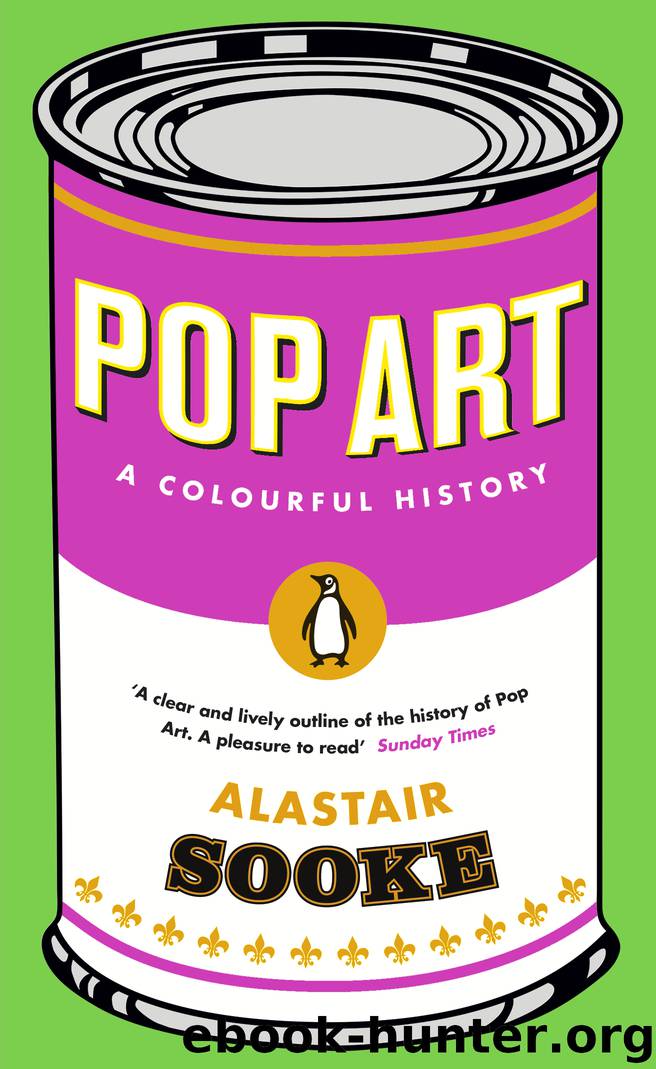Pop Art by Alastair Sooke

Author:Alastair Sooke
Language: eng
Format: epub
ISBN: 9780241973073
Publisher: Penguin Books Ltd
Published: 2015-08-03T16:00:00+00:00
4
The Great Forgotten Pop Artists
Women played a conspicuous role in the imagery of Pop Art from the beginning. There were the superstars like Marilyn Monroe, Elizabeth Taylor and Brigitte Bardot – figureheads of popular culture whom the Pop artists painted time and again. Then there were the pin-ups, glamour girls, B-movie starlets and comic-book heroines who also appeared so often in their work. More than this, though, in order to define itself in opposition to the machismo of Abstract Expressionism, Pop Art – in New York at least, if not LA – deliberately set out to represent a world of domesticity and, by association, femininity. Warhol wasn’t the only artist inspired, in his case by memories of his mother, to depict everyday objects that we encounter in the kitchen as well as elsewhere in the home. When Lichtenstein was embarking on his Pop career, he painted objects culled from newspaper and magazine advertisements aimed squarely at female consumers. In Washing Machine (1961), a manicured woman’s hand sprinkles yellow detergent from a packet into the drum of an open appliance. The following year, Lichtenstein presented more disembodied hands, this time with polished red fingernails. One sprays an aerosol can. Another wipes a surface with a sponge. Both are engaged in that bog-standard domestic chore: cleaning.
In his early diptych Step-on Can with Leg (1961), the artist shows us the calf and foot of a housewife wearing shiny high heels decorated with a bow, operating a simple pedal bin embellished with a floral design. Ruscha once remarked that seeing a reproduction of Johns’s Target with Four Faces in the late Fifties was the ‘atomic bomb’ of his art education; Lichtenstein’s Step-on Can with Leg had a similarly explosive effect upon the British Pop artist Allen Jones, who was astonished when he first saw it. ‘It just knocked me out,’ he recalls. ‘It took the brakes off. Suddenly you realized one should not have any kind of brake on one’s imagination or enquiry.’ Lichtenstein’s painting became a ‘talisman’ for Jones, encouraging him to be ‘fearless’ in his own art. Arguably it is the template for the many seductive women’s legs, also wearing stockings and high heels, which Jones would go on to paint himself.
In time, Jones would also be responsible for some of Pop’s most controversial (and ‘fearless’) sculptures: Hatstand, Table and Chair (all 1969). In these infamous artworks, half-naked, heavily made-up fibreglass mannequins, dressed in kinky leather lace-up boots and other skimpy accoutrements from the boudoir, simultaneously function as provocative items of furniture. A woman on all fours with her breasts hanging free stares down at a handheld mirror placed on a shaggy cream rug beneath her while supporting a plane of glass on her back: she’s the table. Another woman lies on her back, pulling her knees up to her naked bosom, enabling a black leather cushion to rest on the underside of her thighs: here is Jones’s Chair. Hatstand is the least obviously practical piece of furniture of the three: a
Download
This site does not store any files on its server. We only index and link to content provided by other sites. Please contact the content providers to delete copyright contents if any and email us, we'll remove relevant links or contents immediately.
The Art of Boudoir Photography: How to Create Stunning Photographs of Women by Christa Meola(18613)
Red Sparrow by Jason Matthews(5465)
Harry Potter 02 & The Chamber Of Secrets (Illustrated) by J.K. Rowling(3669)
In a Sunburned Country by Bill Bryson(3536)
Drawing Cutting Edge Anatomy by Christopher Hart(3522)
Figure Drawing for Artists by Steve Huston(3445)
Harry Potter and the Prisoner of Azkaban (Book 3) by J. K. Rowling(3347)
The Daily Stoic by Holiday Ryan & Hanselman Stephen(3299)
Japanese Design by Patricia J. Graham(3165)
Make Comics Like the Pros by Greg Pak(2912)
The Roots of Romanticism (Second Edition) by Berlin Isaiah Hardy Henry Gray John(2910)
Stacked Decks by The Rotenberg Collection(2880)
Harry Potter and the Deathly Hallows (7) by J.K. Rowling(2714)
Draw-A-Saurus by James Silvani(2711)
Tattoo Art by Doralba Picerno(2661)
On Photography by Susan Sontag(2631)
Churchill by Paul Johnson(2578)
The Daily Stoic by Ryan Holiday & Stephen Hanselman(2569)
Drawing and Painting Birds by Tim Wootton(2508)
